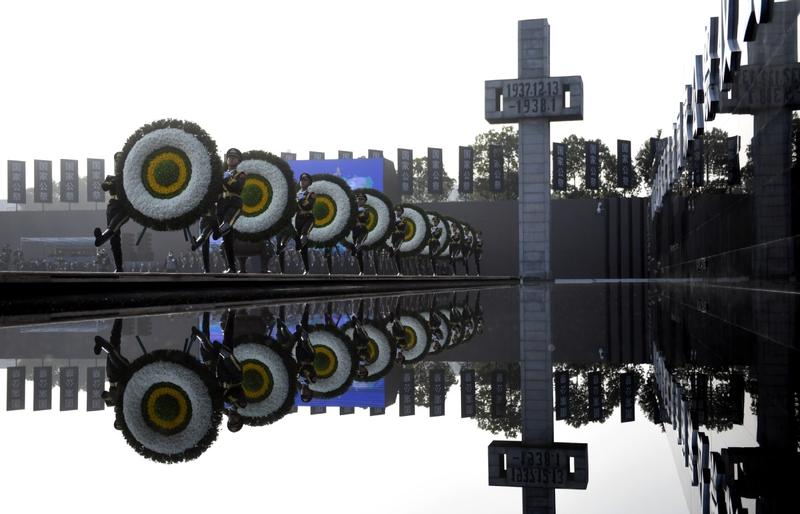 A memorial ceremony is held in Nanjing, Jiangsu province, on Dec 13, 2020 to mourn the 300,000 victims of the Nanjing Massacre. In 2014, China's top legislature designated Dec 13 as the National Memorial Day for Nanjing Massacre Victims. (CUI XIAO / FOR CHINA DAILY)
A memorial ceremony is held in Nanjing, Jiangsu province, on Dec 13, 2020 to mourn the 300,000 victims of the Nanjing Massacre. In 2014, China's top legislature designated Dec 13 as the National Memorial Day for Nanjing Massacre Victims. (CUI XIAO / FOR CHINA DAILY)
Dec 13 is a special day for Chinese Canadians in Ontario, for reasons going back more than 80 years.
The day marks the 83rd anniversary of the Nanjing Massacre, China's seventh National Memorial Day for the victims, the fourth anniversary of Nanjing Massacre Commemorative Day in Ontario, and the third anniversary of the establishment of the Nanjing Massacre Victims Monument in Toronto.
In 2017, the Ontario legislature passed Motion 66-establishing the Nanjing Massacre Commemorative Day. Now, every Dec 13 is recognized in Ontario as a day of remembrance for the massacre, the first such commemoration in a Western country
Starting on Dec 13, 1937, the invading Japanese Army captured the city of Nanjing, which was then the capital of China. The lives of 300,000 Chinese civilians and disarmed combatants were brutally wiped out by the Japanese troops in the following six weeks, and an estimated 20,000 to 80,000 women and girls were raped.
ALSO READ: Peaceful development stressed at Nanjing Massacre memorial
But for too long, the Nanjing Massacre has gone unrecognized in the West, and the teaching about the unspeakable tragedy is lacking in schools.
First in the West
In 2017, the Ontario legislature passed Motion 66-establishing the Nanjing Massacre Commemorative Day-proposed by Soo Wong, a former member of the provincial Parliament. Now, every Dec 13 is recognized in Ontario as a day of remembrance for the massacre, the first such commemoration in a Western country.
Wong said it is important for the residents of Ontario, home to the largest Asian community in Canada, to "reflect and educate "about the enduring lessons of the massacre and other World War II atrocities in Asia, as many are unfamiliar with such history.
Wong said the purpose of Motion 66 is to educate and inform.
"We must never forget that during World War II in Asia, Japanese didn't just only attack China, but also many other countries," Wong, who used to be a school board trustee, said in a "History, Culture and Education" webinar on Sunday evening.
READ MORE: Canadians to honor Nanjing victims
Member of Parliament Jean Yip said: "History reminds us to educate ourselves and the next generation so that we can speak out for those who can no longer speak up for themselves."
Amanda Collucci, a Markham city councilor, said: "We hope there is no hatred and discrimination, as those are really the root causes of any of the horrible events. We must remember that as human beings, not (only) between countries, it is really all about humanity."
Cynthia Yu, the webinar organizer and president of the Hong Maple Foundation, said they also wanted to pay tribute to Iris Chang, the late Chinese-American writer.
Chang, author of The Rape of Nanking: The Forgotten Holocaust of World War II, a chronicle of the atrocities committed in that city by the occupying Japanese forces, "helped break a six-decade-long international silence on the subject", Yu said.


